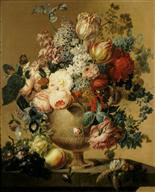(American Romantic Movement)
Il Corvo
(1845)
Mentre, debole e stanco, verso la mezzanotte
scorrea d’antico libro pagine strane e dotte
sonnecchiando, ad un tratto come un picchio ascoltai,
un lieve, un gentil picchio de la mia stanza all’uscio.
- E` qualcuno che picchia de la mia stanza all’uscio,
e non altro, – pensai.
Ricordo. Era il dicembre freddo, e ogni tizzo lento
si spegnea disegnando l’ombra sul pavimento.
Il dì solo anelavo – dacchè invano cercai
oblio nei libri al duolo per la morta Leonora –
per te, raggiante vergine, che in ciel chiaman Leonora,
e qui nome non hai.
E il triste incerto fremito de le rosse cortine
tema ignota e fantastica m’incutea senza fine,
sì che, a calmare i battiti del cuore, io mi levai;
indi: – E` qualcun che picchia de la mia stanza all’uscio,
qualcun che varcar vuole de la mia stanza l’uscio,
non altro, – mormorai.
Calmato allor lo spirito, senza esitare ancora:
- Da voi perdono imploro, signor – dissi – o signora;
ma il fatto è che dormivo, e voi pur piano assai
picchiaste, così lieve della mia stanza a l’uscio,
che avervi udito appena mi pare. – Ed aprii l’uscio;
ma sol bujo trovai.
Dubbio e timor nel bujo m’assalsero, e stupito
restai, sogni seguendo che mai uomo ha seguito;
ma ognor silenzio e tenebre intorno a me scrutai,
sol bisbigliossi un motto, il nome di Leonora!
Lo dissi io stesso, e l’eco rimormorò: Leonora!
Sol questo e nulla mai.
Tornando nella camera con lo spirito agitato,
ecco il picchio ripetersi d’un tratto e più spiccato.
- Oh! certo è a la finestra che battono, – esclamai, -
è là, su la persiana; scopriamo un tal mistero…
tregua un istante, o cuore; scopriamo un tal mistero…
Sarà il vento, – pensai.
A spalancar le imposte mossi, e, agitando l’ale,
entrò un bel corvo antico in aria trionfale.
Non fe’ saluto alcuno, arrestossi mai,
finché, come un padrone, posò lì sopra l’uscio,
di Pallade su un busto, proprio lì sopra a l’uscio.
Fermossi e l’osservai.
E allor lassù mirando quel nero uccello assiso,
il suo grave contegno mi diè lieve un sorriso.
- Rasa hai la cresta, – dissi, – ma un vinto non sarai.
Corvo spettral che vieni tristo dai regni bui,
parla, qual’ è il tuo nome, laggiù nei regni bui?
E il corvo: Non più mai!
Gran meraviglia io m’ebbi quell’uccello ad udire,
benché il motto sì incerto poco volesse dire;
ma pur quella fantastica parvenza io l’accettai,
poiché vedea l’uccello giù, al di sopra dell’uscio,
bestia o uccello, sul busto giù al di sopra dell’uscio,
col nome: Non più mai!
Ma non disse oltre il corvo, fermo sul busto e assorto,
come se pronunziando quel motto ei fosse morto.
Nulla s’intese, e alcuna piuma non mosse mai,
infin ch’io ripetei: – Altri fuggiron via;
ei pur n’andrà siccome le mie speranze via.
E l’uccello: Non mai!
Atterrito da l’arida risposta così adatta:
- Oh, senza dubbio – dissi – d’un corvo qui si tratta,
al quale un infelice padron stretto ne’ guai,
cantando con le lugubri nenie le sue meschine
speranze, in ritornello avrà insegnato alfine
quel triste: Non più mai!
E poiché l’alma al riso moveami ancor l’aspetto
del corvo, il seggiolone volsi a lui dirimpetto,
e tosto dietro a innumeri fantasie mi lanciai
per saper che volesse quel triste antico uccello,
quello sgraziato e magro, spettrale antico uccello
dir con il suo Non mai!
Così fantasticando stetti, senza parlare;
ma dai suoi occhi il cuore io mi sentia bruciare;
un pezzo stetti, e il capo sul velluto appoggiai
del sedil, che la lampada irradiava da l’alto,
la violacea stoffa irradiata da l’alto,
ch’Ella ha lasciato ormai.
Allor dei passi d’angeli udir mi parve e denso
L’aere intorno farsi d’indivisibile incenso.
- Malvagio, a mezzo d’angeli ti manda Iddio, – gridai –
riposo da le assidue memorie di Leonora;
bevi l’oblio, dimentica la perduta Leonora!
Disse il corvo: Non mai!
Profeta, – io feci, – e sempre tal, sia uccello o infido
spettro, ti spinga l’Erebo o la tempesta al lido, –
tu che su questa terra desolata ten vai,
per la mia tetra casa; dimmi schietto, t’imploro:
v’è pace almeno in Galaad?…dimmi, dimmi, t’imploro!
E il corvo: Non più mai!
Profeta – io ripetetti, – sia uccello o spettro errante –
Dimmi, pel Dio che adori, per quel ciel scintillante:
potrà in un Eden lunge l’anima triste assai
trovar la dolce vergine che chiamano Leonora,
la vergine che gli angeli ora chiaman Leonora?
Disse il corvo: Più mai!
Demone o uccello, parti, – proruppi allora, – ai boschi
torna, fra le tempeste, di Pluto ai regni foschi,
né una penna in ricordo di quel che detto or hai
resti! a la solitudine mi lascia, e sgombra via
dal busto! Oh, il becco levami dal core, e sgombra via!
Disse il corvo: Non mai!
E là, senza più muoversi, rimane esso a guardare,
fermo sul busto pallido, de l’uscio al limitare.
Sembrano di sognante demoni gli occhi, e i rai
del lume ognor disegnano l’ombra sul pavimento,
né l’alma da quell’ombra lunga sul pavimento
sarà libera mai!
traduzione di
Francesco Contaldi (1865-1903)
















